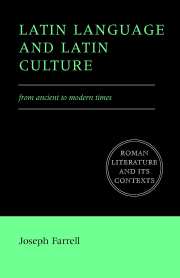2 - The poverty of our ancestral speech
Published online by Cambridge University Press: 26 January 2010
Summary
Poor relations
Again and again, when Latin culture confronts itself and inquires into its nature, it sees Greek. The conclusion that often follows is that Latin is derivative and inferior – that in trying to be Greek Latin dooms itself to epigonal status. For the Latin speaker an authentic and unmediated connection between nature and culture is unattainable. But such a relationship is imagined to exist for Greek, and this belief becomes a source of envy, perceived inferiority, and self-deprecation. To the Greek language Latin culture ascribes not only a more fundamental authenticity, but other qualities as well – a capacity for beautiful and subtle expression, for instance – that it feels unable to claim for itself. In various ways some such view of the relationship between Latin and Greek has been common throughout history. Its validity is apparently supported by the facts of linguistic development, by the literary history of the two languages, and by the explicit testimony of Latin authors themselves. But what has been commonly felt or is apparently true should not blind us to other important ways of construing this relationship and of defining Latin culture.
The theme under discussion runs through Latin literature and through the reception of Latin literature in all periods. So common a theme deserves a name: call it “the poverty topos.” It occurs in several different guises. Most obviously, poverty connotes deficient semantic power.
- Type
- Chapter
- Information
- Latin Language and Latin CultureFrom Ancient to Modern Times, pp. 28 - 51Publisher: Cambridge University PressPrint publication year: 2001



